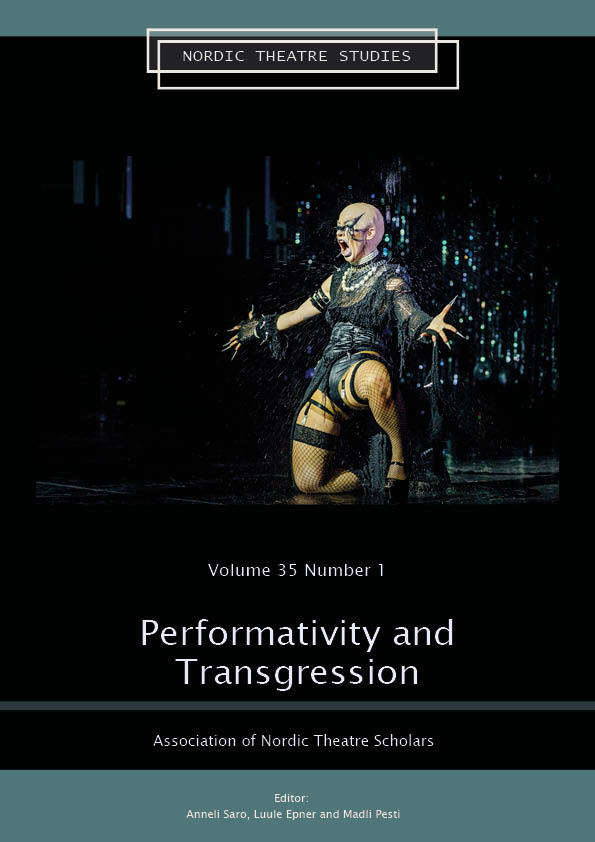Performative Representation of “Others” in the Opera Genre
The Case of Have a Good Day!
DOI:
https://doi.org/10.7146/nts.v35i1.145374Keywords:
opera, performativity, socially vulnerable groups, ethics, reception, transgressionAbstract
Western opera has a longstanding tradition (from Giovanni Battista Pergolesi to Astor Piazzolla) of the representation of the lower strata of society, which usually involves appropriation of the performativity of social groups other than the composer’s own. Such procedure is made for transgressive aims in order to affect the status quo of public discourse and improve social reality. The aim of the research presented in this article is to empirically establish whether the performative representation of a socially vulnerable group in opera affects and empowers individuals belonging to the group. A case in point is a contemporary opera Have A Good Day! (2011) by Lithuanian authors Lina Lapelytė, Vaiva Grainytė, and Rugilė Barzdžiukaitė, which represents the professional activities of supermarket cashiers. The article presents the results of empirical research on the reception of the opera. The research was undertaken by showing the opera to participants who actually work as cashiers. Consequently, the participants were interviewed, and a qualitative content analysis of the gathered data was conducted. The argument of the article is based on theoretical insights on empowerment by Grant Kester, who suggests that artists, in an attempt to empower, might still be exercising unequal power relations. Thus, the real transgression might never take place. The argument of this article is that Have a Good Day! attempts to, but fails to empower its subjects.
References
Barthes, Roland. 1977. Image, Text, Music. London: Fontana Press.
Brecht, Bertolt. 2000. “Theatre for Learning”. In Carol Martin and Henry Bial (eds.). Brecht Sourcebook. New York: Routledge, 21–8.
Bourdieu, Pierre. 1984. Distinction: A Social Critique of the Judgement of Taste. Cambridge: Harvard University Press.
Bishop, Claire. 2006. “The Social Turn: Collaboration and Its Discontents”. ARTFORUM
February 2006, VOL. 44, NO. 6. https://www.artforum.com/features/the-social-turn-collaboration-and-its-discontents-173361/ (15.2.2024).
Festival Passages. 2015. “La Lituanie ose l’opéra documentaire“. Association Passages YouTube channel, 17.5.2015. https://www.youtube.com/watch?v=D_H1g7lQyX8 (15.2.2024).
Juodelienė, Violeta. 2013. “Kasos aparatų karalienės“. Kauno diena 8.11.2013. https://kauno.diena.lt/naujienos/kaunas/menas-ir-pramogos/kasos-aparatu-karalienes-426687 (15.2.2024).
Kester, Grant H. 1995. “Aesthetic Evangelists: Conversion and Empowerment in Contemporary Community Art.” Afterimage 22/6, 5–11.
Kester, Grant H. 2005. “Conversation Pieces: The Role of Dialogue in Socially-Engaged Art”. In Zoya Kucor and Simon Leung (eds.). Theory in Contemporary Art Since 1985. Oxford: Blackwell, 153–65.
Rancière, Jacques. 2004. Aesthetics and Its Discontents. Cambridge: Polity Press.
Rappaport, Julian. 1981. “In Praise of Paradox: A Social Policy of Empowerment Over Prevention.” American Journal of Community Psychology 9(1), 1–25.
Rappaport, Julian. 1987. “Terms of Empowerment/Exemplars of Prevention: Toward a Theory for Community Psychology”. American Journal of Community Psychology 15(2), 121–48.
Rappaport, Julian and Marc A. Zimmerman. 1988. “Citizen Participation, Perceived Control, and Psychological Empowerment.” American Journal of Community Psychology 16 (5), 725–50.
Remeika, Arnoldas. 2021. “LNOBT premjerose – puošnus aprangos kodas ir dar daugiau šventės.” Lietuvos nacionalinis operos ir baleto teatras webpage, 12.11.2021. https://www.opera.lt/naujienos/lnobt-premjerose-puosnus-aprangos-kodas-ir-dar-daugiau-sventes/1264 (15.2.2024).
Rosero, Andrés David Montenegro. 2013. “Locating Work in Santiago Sierra’s Artistic Practice.” Theory and Politics in Organisation 13(1), 99–115.
Théâtre contemporain. 2015. “Entretien avec R. Barzdžiukaitė Et V. Grainytė Pour “Bonne Journée!” https://www.theatre-contemporain.net/spectacles/Bonne-journee/videos/Entretien-avec-Rugile-Barzdziukaite-et-Vaiva-Grainyte-pour-Bonne-journee-Festival-Passages-2015?autostart (15.2.2024).
Young, James O. 2000. “The Ethics of Cultural Appropriation”. The Dahlhousie Review 80 (3), 301–16.
Young, James O. 2010. Cultural Appropriation and the Arts. Oxford: Blackwell Publishing Ltd.
Zimmerman, Marc A. 2000. “Empowerment Theory Psychological, Organizational and Community Levels of Analysis”. In Julian Rappaport and Edward Seidman (eds.). Handbook of Community Psychology. Amsterdam: Kluwer Academic Publishers, 43–63.
Downloads
Published
How to Cite
Issue
Section
License
The copyright belongs to the authors and Nordic Theatre Studies. Users can use, reuse and build upon the material published in the journal but only for non-commercial purposes. Users are allowed to link to the files, download the files, distribute the files on a local network (preferably by links), upload the files to local repositories if their institutions require them to do so, but not republish the files without proper agreements with the journal and the author.

